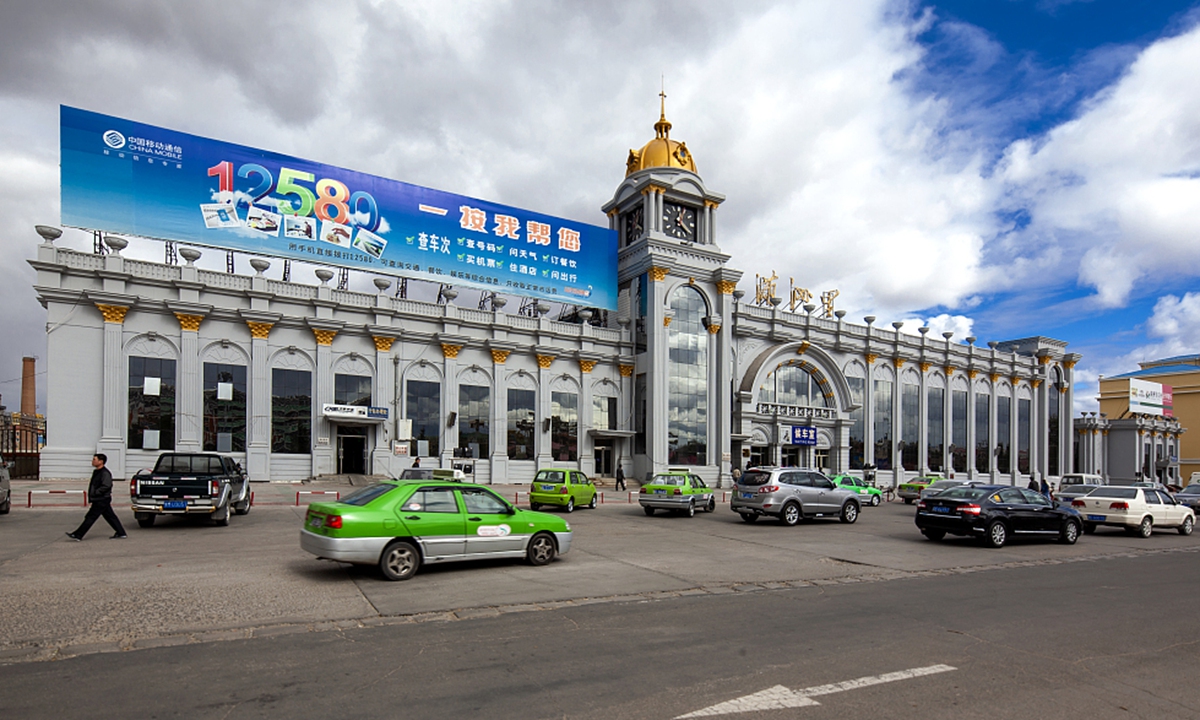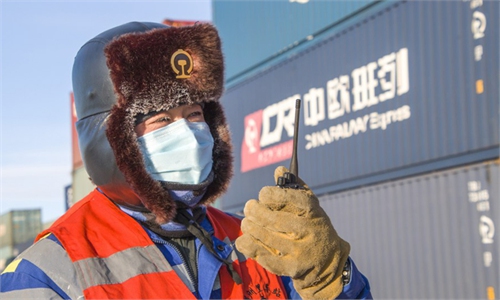
Manzhouli File Photo: VCG
A major land port in Manzhouli, North China's Inner Mongolia Autonomous Region, which borders with Russia and handles the land transportation of more than 65 percent of China-Russia bilateral trade, has tightened epidemic prevention and control work after new outbreaks were reported in the region over the weekend.
However, sources and traders said that the new measures will not have a major impact on operations and trade through the port thanks to effective measures put in place to ensure smooth operations under strict COVID-19 rules.
The border port in Manzhouli will implement strict personnel arrangements, so that in principle, no less than 30 percent of the staff will work at home starting from Monday, a source at the port told the Global Times on Sunday.
Moreover, local airport and railway customs posts must designate no less than 30 percent of their total staff as reserves just in case, according to the source.
This came after three positive cases were found in regular nucleic acid tests, according to a statement by the epidemic prevention and control team of the region on Saturday. These individuals' residential compounds and working places, close to the border, have been put under lockdown, local media outlets reported.
From 4 pm Saturday to noon on Sunday, 17 new cases were confirmed in Manzhouli, and one case was asymptomatic, bringing the total number of confirmed cases to 19, in addition to two asymptomatic infections.
The National Health Commission and the National Bureau of Disease Control and Prevention said that they are sending a working group to Inner Mongolia to guide local officials in dealing with the new outbreak.
Manzhouli port has taken measures to ensure the safe customs clearance of cargo vehicles amid the epidemic.
For example, after a Russian freight vehicle enters the designated transshipment area at the Manzhouli port, it drops an empty trailer and hangs a freight trailer that was transported to the area by a Chinese freight vehicle in advance, before coming across the border to the Chinese side. After entering, the empty trailers will be directed into a designated area for disinfection and loading.
In addition to the new measures, since the last outbreak in the region, people have been working from home, and only a few people have maintained normal operations at the port, a source at the Manzhouli port told the Global Times on Sunday.
In order to minimize personnel flows, according to the requirements of the Manzhouli municipal COVID-19 epidemic control headquarters, all roads connecting the city to other locations are being tightly controlled. Except for the delivery of daily necessities, all people and vehicles are prohibited from leaving the city, media reports said.
Despite the new measures, there has been no significant impact on clearance at the border port so far, given the effective measures in place to ease the potential disruption, several traders told the Global Times on Sunday.
Some traders said that they have been notified by customs that it won't accept printed waybills from Russian railway companies as part of the epidemic prevention measures.
Instead of providing waybills, the overseas agent shipper is now responsible for providing scanned documents required for China's customs declaration in advance before and after the overseas shipment, Tommy Tan, president of Shanghai EPU Supply Chain Management Co, an agent of China-EU railway freight trains, told the Global Times on Sunday.
After the goods arrive, the railway only needs to notify the port agent of the arrival of the goods after completion of the system entry, Tan further noted.
Traders said that the simplified procedures such as the transshipment at the border and the paperless measures at customs have greatly ensured the smooth operation of trade deliveries.
As of November 10, the returned heavy container rate of China-Europe freight trains via Manzhouli and Suifenhe railway ports was 100 percent, according to the Manzhouli railway port station.
According to statistics released by the General Administration of Customs of China on November 7, China-Russia trade increased by 30.9 percent year-on-year in the first ten months of 2021, reaching $115.66 billion, despite the epidemic.


